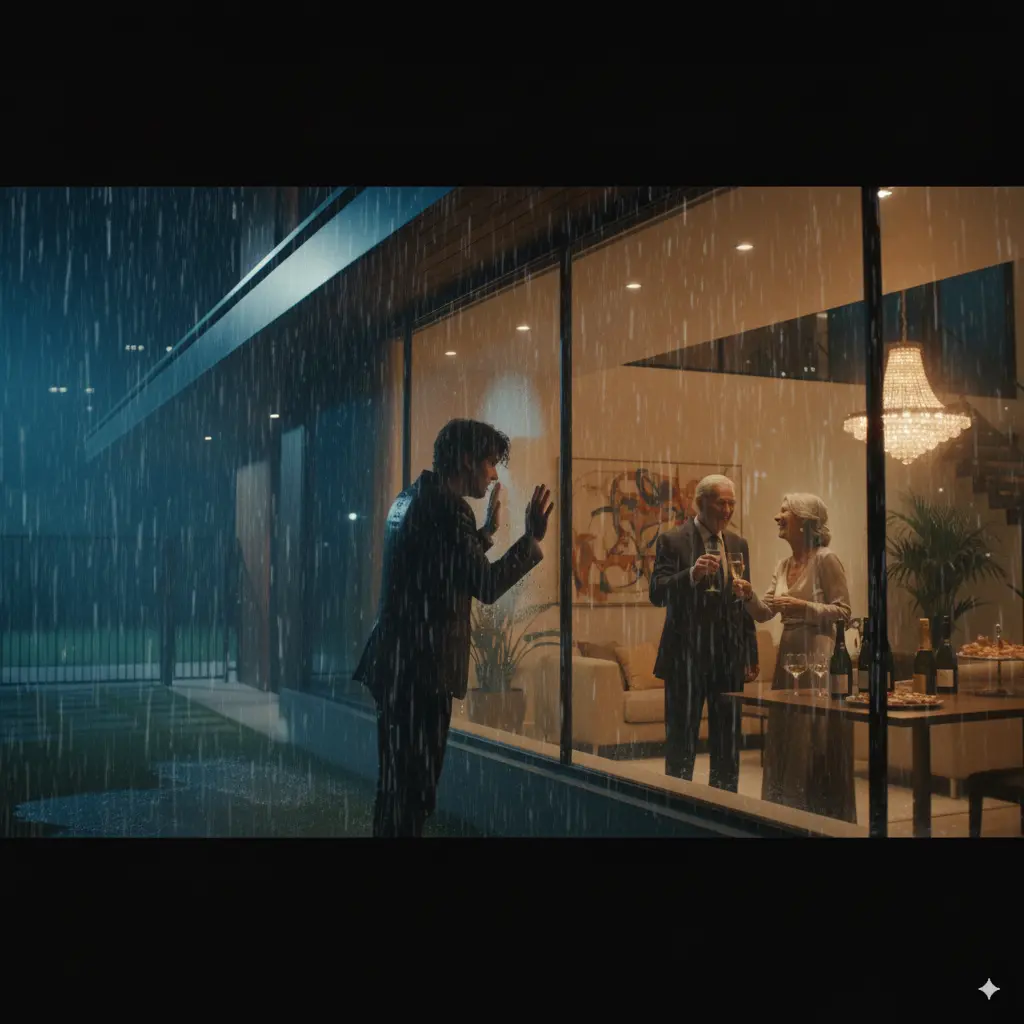There was a rapid scurrying noise in the corridor outside their bedroom in the dark. Shadows darted along the walls, though no one moved, stretching long and thin as if the house itself breathed. A guttural whisper rose from the hallway, making them stiffen with dread.
The temperature plunged suddenly, their breath blooming in pale clouds. Windows opened and banged shut in rapid succession, echoing like cannon fire down the corridor. They heard people talking. For a fleeting second, what seemed like a face flickered and disappeared.
They clutched each other, whispering frantic arguments about leaving. Pride tangled with terror. The mansion was worth millions, a prize they believed they deserved. But every creak in the floorboards convinced them the house was being burgled, and that they might become collateral if they stayed.
Just days earlier, the house had been quiet and orderly, its marble floors gleaming beneath soft lamplight. Marco, the owner, had paced the foyer with his suitcase in hand, muttering about the impossibility of rearranging a last-minute business trip. Everything had to be settled before he left.

The $3 million property wasn’t just bricks and glass; it was Marco’s safe haven. But what troubled him most was not the house itself—it was the small gray cat weaving around his ankles. She needed feeding, company, and a watchful eye while he traveled overseas.
Hiring a stranger through a service felt reckless. The thought of unknown hands fumbling with alarm codes or prowling through private rooms made his stomach tighten. If he had to trust anyone, perhaps reluctantly, it would be people who at least understood the house’s history.
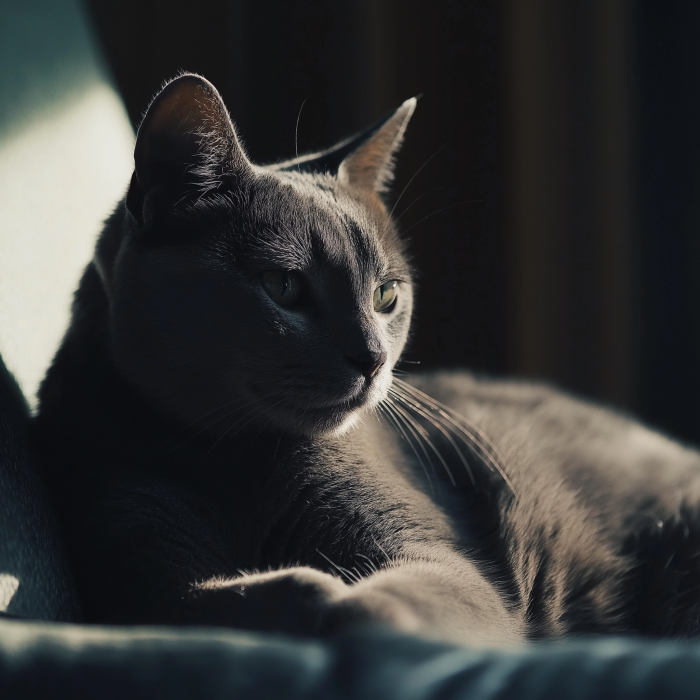
That’s why his aunt and uncle came to mind instantly. They stayed nearby and were familiar with the home, if only from strained family gatherings in years past. For a reserved man like him, inviting them wasn’t his first choice, but it seemed easier than risking an outsider or disturbing neighbors with the responsibility.
This aunt and uncle had fallen out with his father many years ago. That was before his father inherited the mansion. In turn, Marco inherited it from him. Of course, by then the building had been falling into disrepair, and Marco had to personally oversee its many renovations.
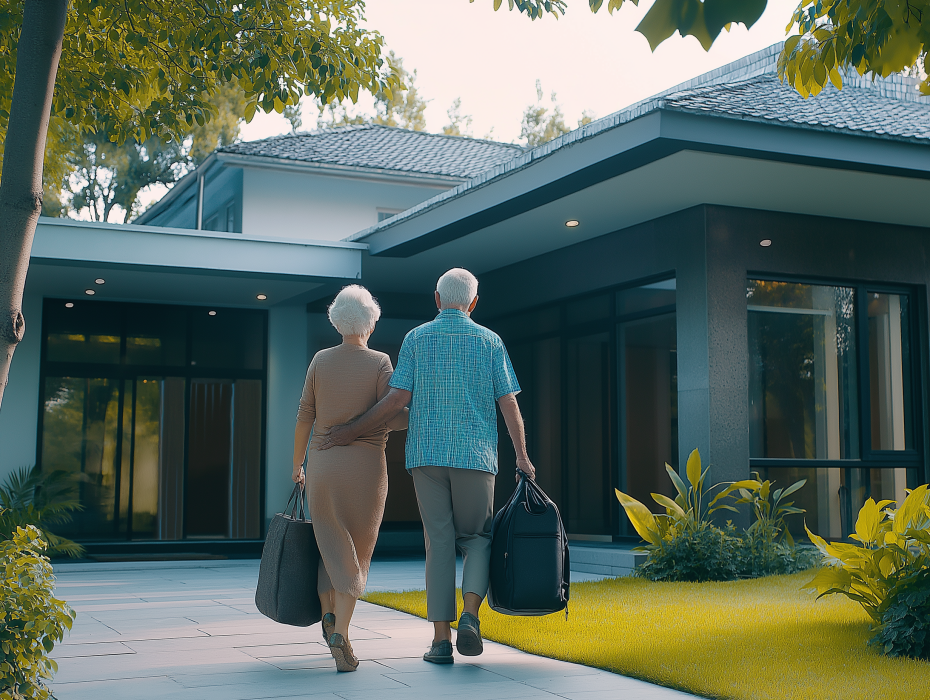
Over the years, Marco had striven to maintain a cordial relationship with the old couple. After all, they were the only people he could call “blood” hereabouts. He wasn’t sure whether they would accept his invitation at such short notice. He cursed his luck again that he had to leave so soon.
Their reaction, however, surprised him. Over the phone, his aunt’s voice brightened almost too quickly. “Of course, Marco. We’d be happy to,” she’d said, sweetness dripping in every syllable. It was as though they’d been waiting for such an opportunity to help him out.
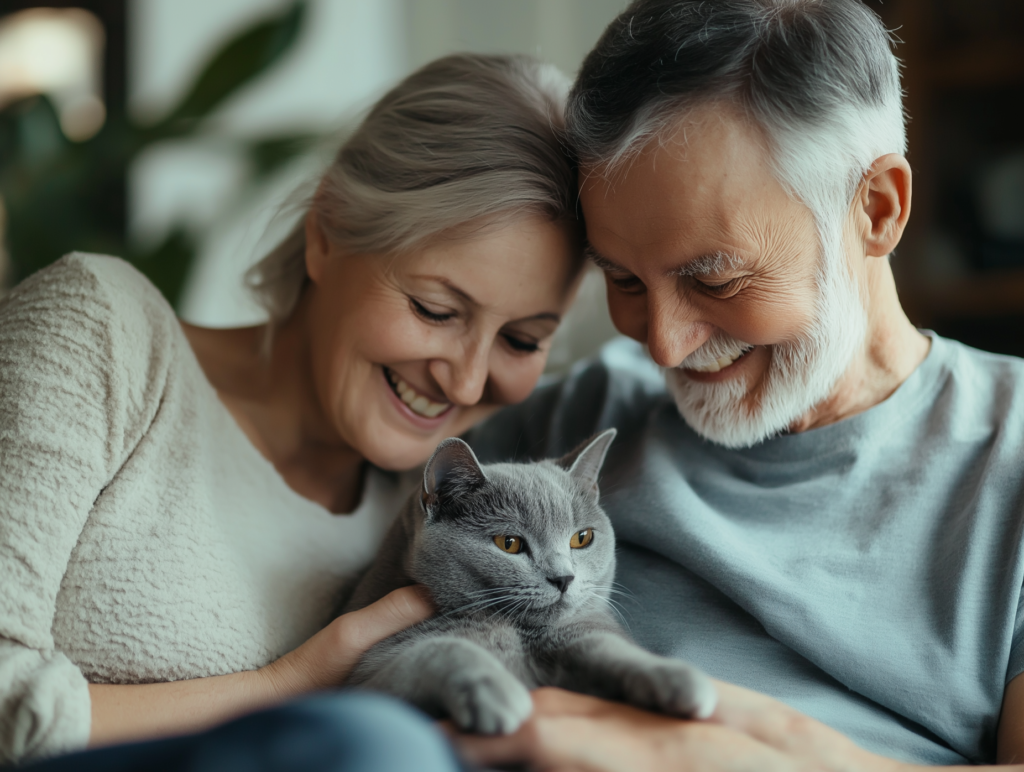
His aunt and uncle loved the cat, or claimed they did, and they understood the temperamental alarm. The arrangement seemed awkward but sensible: feedings, plants, packages. Seven days, perhaps six. He left extra tins, labeled timers, spare batteries, and a neat note reminding them about the stubborn back-door bolt.
They waved from the porch with practiced warmth, luggage disproportionate to cat-sitting. He pretended not to see the wheeled trunk, the garment bag, and the extra shoes. A week is generous, he decided, climbing into the rideshare. He texted the alarm code anyway, because he was polite, occasionally too polite.

Between meetings, reassuring messages pinged his phone. Cat excellent. Plants perky. One photo showed his aunt beside the grand piano, thumbs up; another, his uncle adjusting the thermostat as if awarding efficiency medals. A final text arrived uninvited: House feels like family again. Rest easy. We’ve got it.
As his return flight approached, Marco pictured his empty house waiting for him, the cat purring on the couch. He longed for silence, for the comfort of his own bed. What he wouldn’t imagine was the turn events would soon take.

In his absence, his uncle and aunt had been studying, marking, circling words in old deeds, their excitement sharpening with every page. “See here,” his uncle muttered, finger stabbing a clause. “This house always was family property.” His aunt nodded, emboldened by ink and an imagined inheritance.
The flight home landed just after dusk. Marco wheeled his suitcase through the airport, imagining his first night back. He pictured the familiar stillness, the scent of polished wood and jasmine from the garden. Relief pulsed in him as his car turned into the familiar lane.

He was exhausted but pleased by his foresight. The front gate recognized his car; the driveway lamps sequenced obediently. But the key balked in the deadbolt, grinding against a stranger. He tried the keypad. Denied. The doorbell camera blinked politely, then requested that he identify himself.
Marco laughed, then didn’t. He called them. Footsteps approached; the peephole darkened. His uncle’s voice arrived like a hotel clerk’s: “We’re resting. Come later”. Marco stared at the oak, dumbfounded, the suitcase handle biting his palm. “Open the door,” he said. “You were cat-sitting, not commandeering the living room.”

Surprisingly, the locks remained. The porch light brightened as if spotlighting a suspect. His aunt appeared at the dining room window, index finger raised. “Inside voice, dear,” she mouthed. “Neighbors.” Marco stepped back, his pulse climbing. He had paid for every tile, hinge, and hinge-squeak. Tonight, he apparently owned only the driveway.
Resolved to settle the problem once and for all, Marco finally called the police. When the police officers arrived, there was a bit of a to-do as Marco thought he could hear hurried mutterings and some scurrying. The police asked the couple to open up.
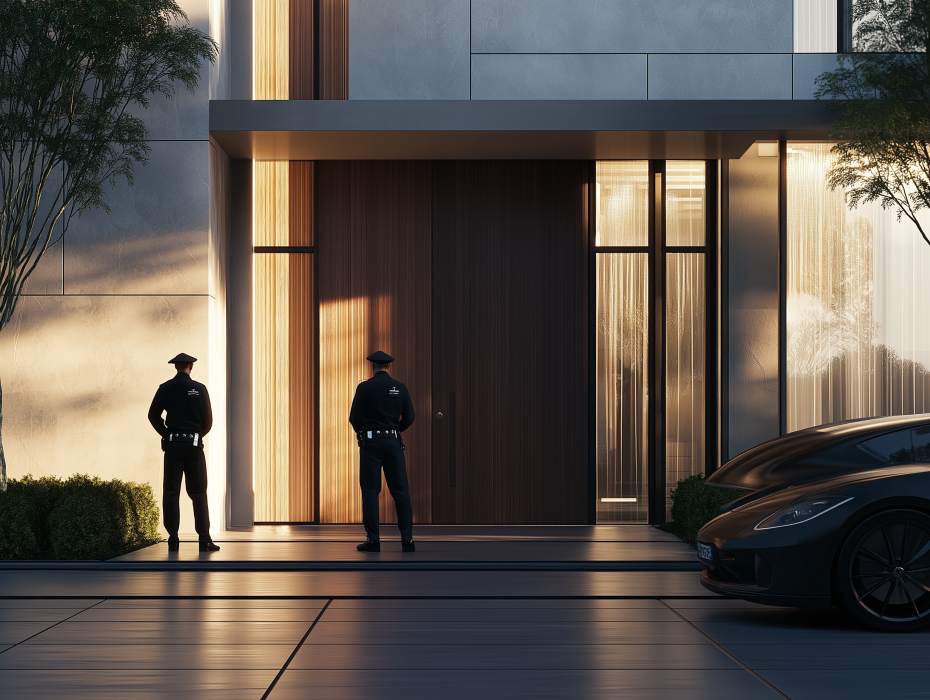
Fifteen minutes later, the door was cracked open two inches. His uncle presented a folder of photocopies, highlighter scars, and sticky flags. “Found irregularities,” he announced. “Your deed chain, the transfer from your grandmother, contains some ambiguous language.” The police officers looked as surprised as Marco.
As the officers pressed, the uncle said to them, “Counsel says possession is arguable. Let’s have some clarity first.” The police took in the harmless-looking, smiling old couple and advised a fuming Marco to pipe down. They told him that they would need to investigate further, even if they had to oust them by force.
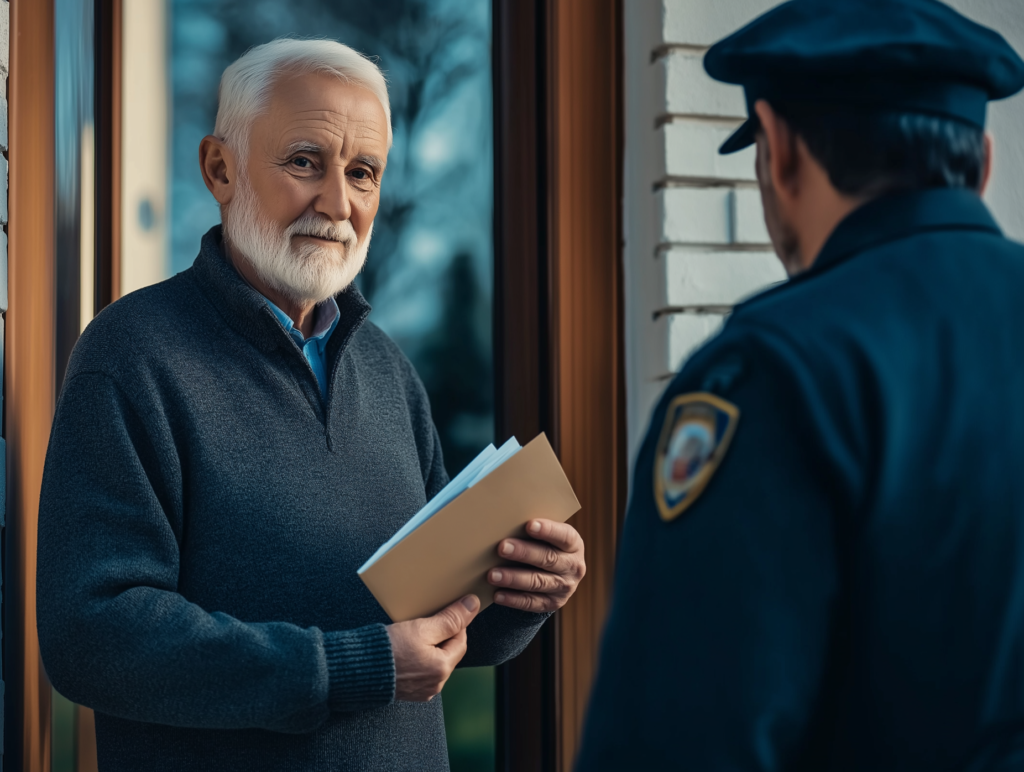
Marco blinked at the documents taped like crime-scene diagrams. It was the first time he’d heard of any ambiguity, and definitely the first time he’d been barred from his own foyer. “You’re joking!” he said, looking at the retreating backs of the officers. His aunt smiled a smile designed for funerals. “It’s a family home. We’re only protecting family interests.”
“You were feeding a cat,” he managed weakly, “not staging a coup.” His uncle shrugged, legalese inflating him. “We’d rather resolve this amicably. Let’s maintain current possession while our lawyer petitions. You should consider alternative accommodation.” The window slid shut. The alarm panel chirped triumphantly like a bell after a beheading.

He tried every tactic a civilized person learns. He talked to them of fairness, patience, and shame. They countered with words like “constructive possession” and “equitable interest”. A neighbor paused, waved, and retreated behind newly planted hydrangeas.
Inside, his aunt rearranged photo frames, sliding Marco’s certificates aside to display a faded portrait of her wedding day. “House looks warmer already,” she said. His uncle nodded approvingly, sipping tea from Marco’s best porcelain. From the lawn, Marco watched through the glass. The owner was excluded while guests performed ownership.
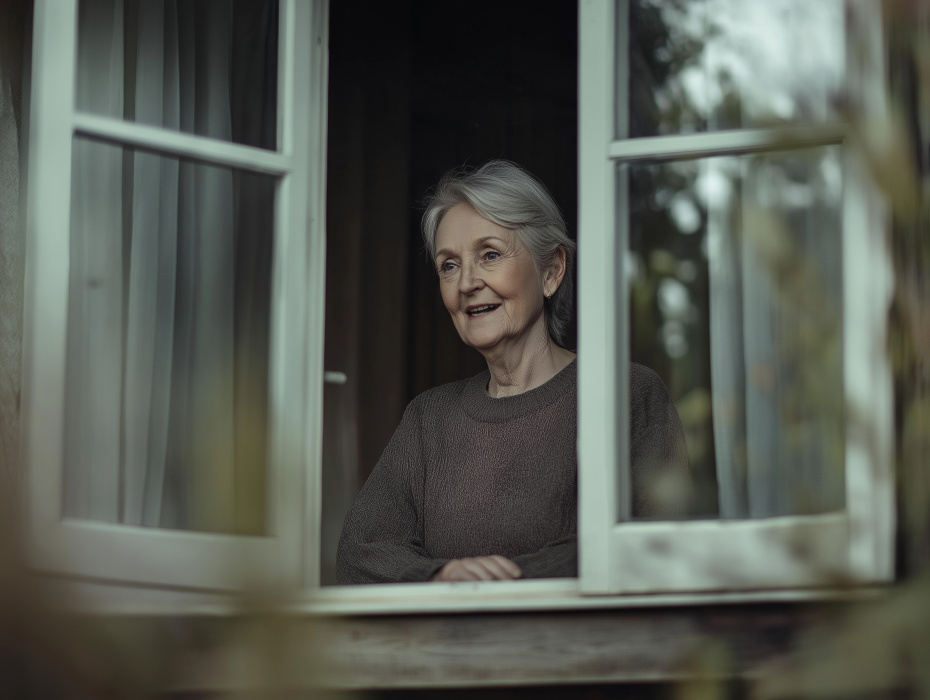
When Marco tried knocking again, his aunt opened the window politely. “It’s late, dear. We’ll discuss tomorrow after we’ve rested. Don’t embarrass yourself on camera.” He sputtered protests, but she blew him a kiss and drew the curtains firmly. He stared at the drawn fabric, realizing fabric now served as borders, flimsy but impossible to cross.
They cooked supper loudly, aromas of onions and garlic spilling into the street. Marco sat in his car inhaling smells emanating from provisions he’d bought, sauted in his pans, yet eaten by others. Laughter rolled through windows, and silverware clinked. The house glowed as though welcoming someone. He was left outside.

His uncle texted smugly: “Everything secure tonight. We’ll brief counsel tomorrow. Sleep well.” Marco gripped his phone until the plastic groaned. He typed responses, deleted them, typed again. Sleep well, in his house, while he paced the pavement. Even the cat seemed to ignore him, tail flicking behind the curtained windowpane upstairs.
Later, he heard the piano. A hesitant scale, and then chords mangled into cheer. His aunt applauded herself. Marco flinched. That bench was still dented from his father’s weight. Music now declared someone else’s history. He sat on the curb, imagining his father’s scowl at this trespass masked as recital practice.

Fine, he finally thought. Paperwork meets paperwork. He called his lawyer. The measured voice was brutally honest: contesting through the loophole might take months, even years, and a judge could freeze occupancy meanwhile. “Document everything,” counsel said. “Do not escalate. Absolutely no theatrics.” Marco thanked him, then ended the call.
Marco sat on the hood of his car as the sunrise bleached the street. He imagined months of dueling filings while he stayed at a hotel nearby. He imagined the cat, betrayed by the very people who promised kibble. He imagined becoming a cautionary anecdote at neighborhood barbecues for years to come.
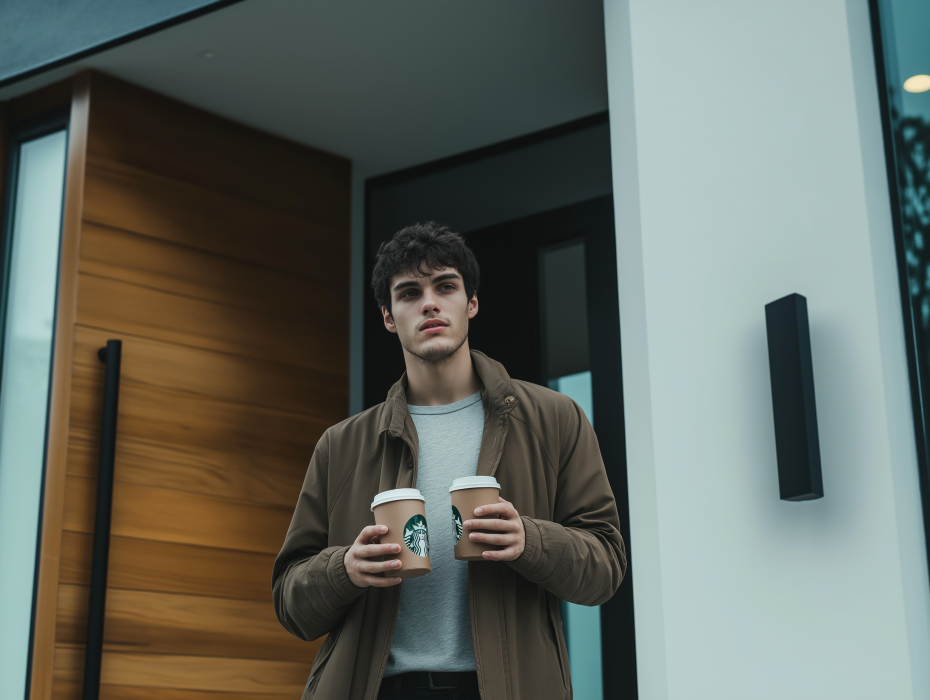
The next morning, Marco returned with coffee, trying diplomacy. “Perhaps you should wrap things up before lawyers complicate matters,” he suggested through the door. His uncle’s reply floated back, buoyed with confidence: “We’re preserving the estate’s legacy.” Legacy. As if legacies depended on stolen locks and inherited arrogance.
Neighbors began noticing soon. Mrs. Hargrove from next door asked him why “the older couple” always waved from Marco’s balcony. “They seem delightful,” she said, smiling. Marco muttered about family helping out. Inside, his aunt adjusted the drapes. It seemed reputation was slowly rewriting possession, brick by brick, smile by smile.
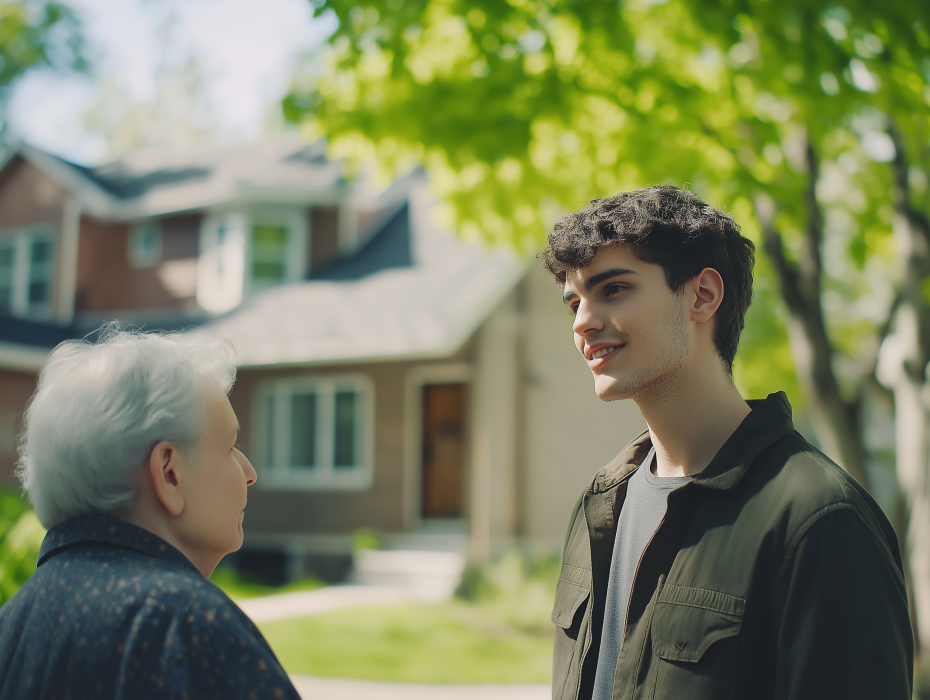
Marco attempted to guilt-trip them. “This isn’t fair. I trusted you.” His aunt’s voice softened, syrupy: “Exactly, dear, you trust us. Why break that now?” His uncle added, “Paperwork is messy. Let’s settle things civilly.” Their civility dripped like varnish, covering theft with politeness. Marco’s throat ached from unscreamed words.
In the kitchen, he heard them catalogue groceries aloud. “Milk, eggs, enough for the week.” Marco realized with a sting that they’d bought supplies. Not guests provisioning politely, but residents investing confidently. Bags rustled like contracts. He leaned against his car, stunned by plastic’s whisper: permanence. His house was becoming theirs audibly.

By nightfall, their laughter quieted into murmurs. One could hear shuffling papers, the thud of a stapler, perhaps signatures rehearsed. His aunt hummed a lullaby, his uncle muttered in legal language. Marco stared at his laptop screen glowing in the car, every pixel urging him toward a plan beyond knocking.
Anger rose, hot and useless. He could bang doors, call stations, and ignite an immediate war. Or he could think. The house was his engineering sandbox, with redundant systems, discreet sensors, networked lights, and geofenced locks. It responded to his phone, voice, and schedule. Somewhere inside, it still responded to him and nobody else.

He opened his laptop. The driveway knew his MAC address; the mesh network recognized a silent friend. He authenticated through a backdoor he had never documented because, honestly, how was he to know he would need to? Status lights marched across his screen.
Battery levels, speaker groups, and camera grids—they were all present, awake, and awaiting instruction. It was clear what he had to do now. A few clicks and adjustments would give him the result he wanted.
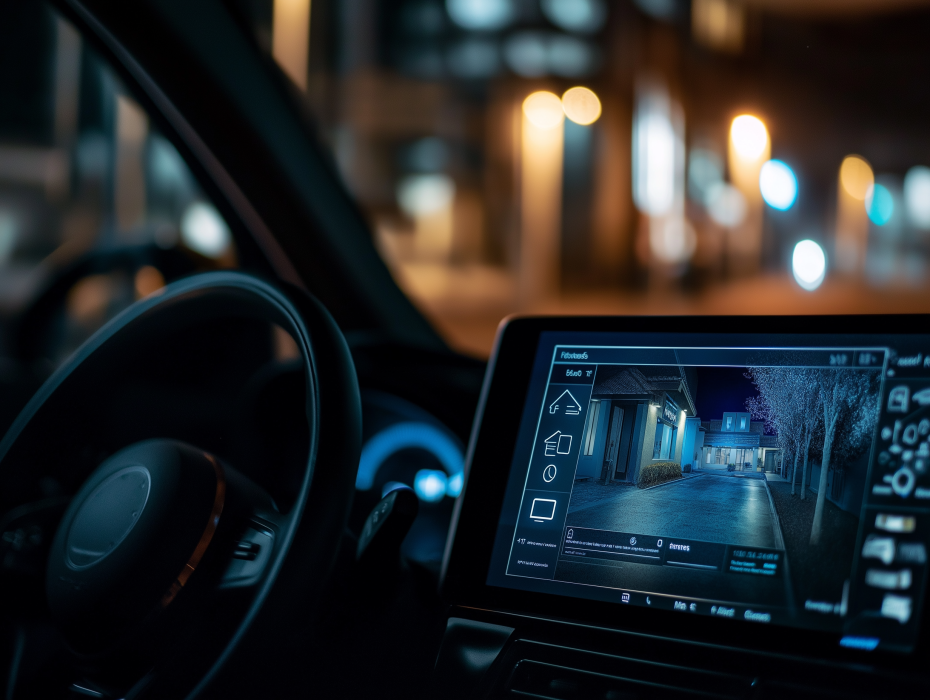
He swallowed. He did not want a courtroom. He wanted an ending that arrived quickly, with nobody injured, with a lesson engraved deeper than a judgment. He pictured his aunt’s satisfied smile evaporating. He pictured his uncle mispronouncing habeas something while sprinting down the lawn in expensive slippers.
But he decided he would give them one last benefit of the doubt. He texted them for the last time. “Please let me in. This isn’t right.” A bubble appeared in reply, vanished, then returned. “We’re meeting ours soon,” they wrote. “We’ll be in touch regarding terms.” Marco stared until the letters blurred into a slow gray fog.
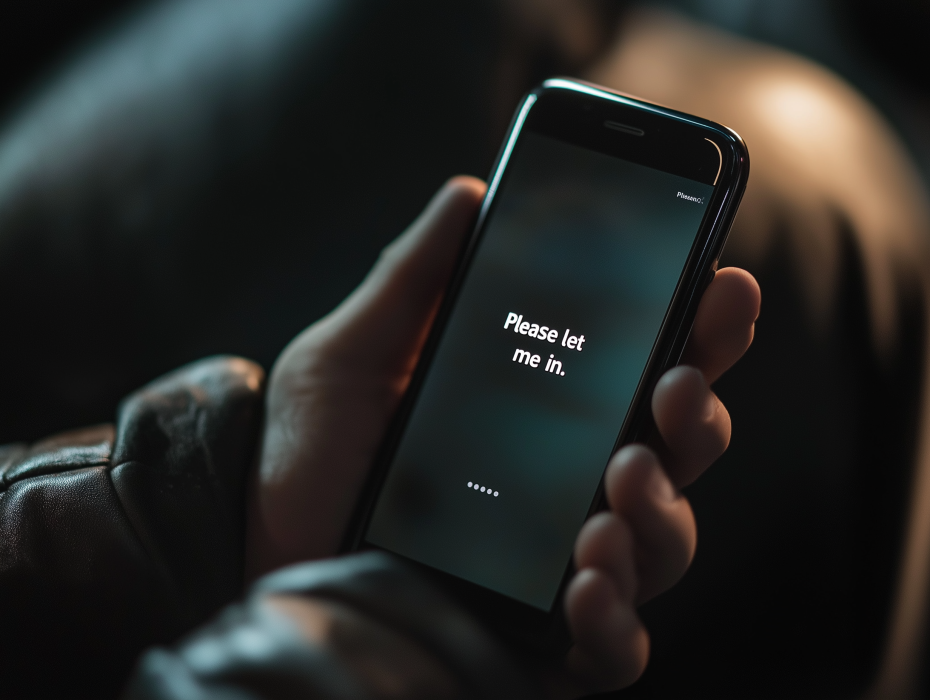
Terms, he thought, are where you draw lines. He lowered the seat, closed his eyes for ten brittle minutes, then sat up and mapped everything. Cameras came first. Sensors second. Audio third. Lights were to be used as punctuation marks. If fear needed a script, he would direct it responsibly.
He rechecked neighborhood feeds, schedules, sunrise times, and the probability of passing patrols. He built conditions that denied harm but encouraged movement: music here, silence there, locks that hissed open, locks that sighed shut. If fear were to be a choreography, he would stage an exit—voluntary, immediate, and documented by every cautious camera.

A breeze rolled down the street as if the city exhaled. Marco parked two houses away, laptop open, phone linked. Kitchen silhouettes moved across familiar furniture he had purchased. He steadied his breathing. Gentle, he instructed himself. They may be stubborn, but not monsters. But tonight, they had to move.
They brewed chamomile, toasting each other’s cleverness. “Counsel will confirm,” his uncle said, stacking papers like poker chips. His aunt added honey to her cup, savoring victory. Outside, Marco watched through blinds, fingers poised over keys. The house sat in silence, waiting for his quiet instructions.

A soft chime whispered through the pantry sensor. His aunt froze, cup midair. “Old circuits,” his uncle muttered, checking his phone. Another chime pulsed. He frowned, thumb hovering over dismiss. “Motion,” the app claimed. “False alarm,” he told her firmly, though his own shoulders stiffened under his shirt.
Upstairs, a hallway light flickered alive, steady, then dark again. She wrung her hands. “Draft in the switchboard.” He nodded sharply, as though naming an ailment cured it. They resumed sipping tea louder, trying to be brave. From his car, Marco smirked, programming another faint sigh of doors settling open, then shut.
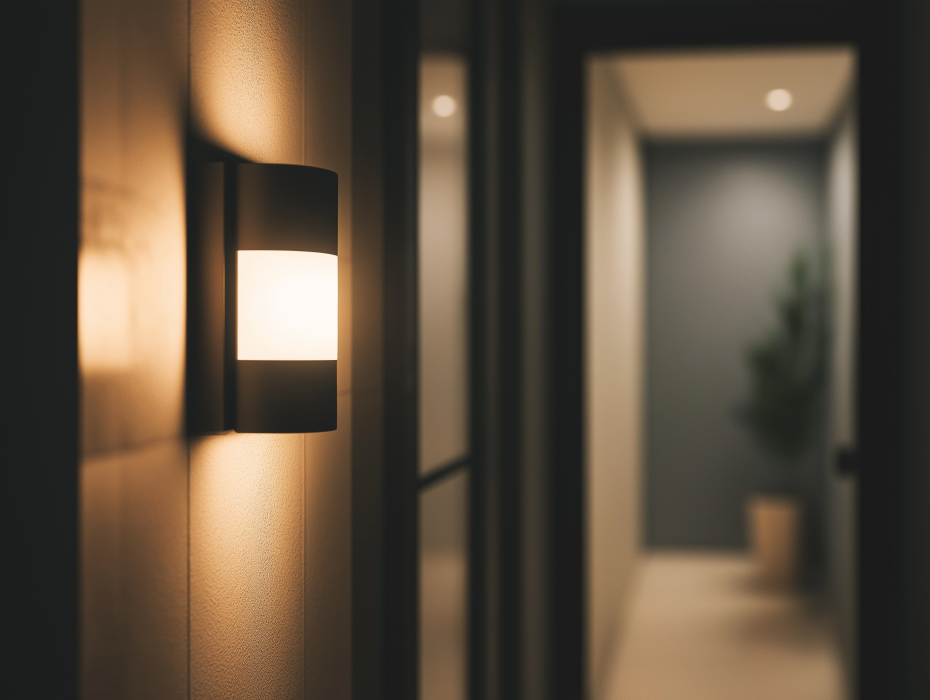
The cat padded across the counter, tail bushed. She hissed once, then vanished into shadow. “Animals sense storms,” his aunt whispered, unsettled. “Or mice,” he countered, though his eyes tracked the darkness uneasily. Arrogance battled primal nerves. Marco queued the stereo: a gentle rustle, like bags shifting downstairs.
They stiffened. “Probably pipes expanding,” he offered. “It’s September,” she snapped. He fell silent. A cabinet door knocked once, decisively, then latched. Her tea sloshed onto the tablecloth. He dabbed it up quickly, determined not to surrender composure. Pride demanded homeowners explain things, even ones they had recently stolen.
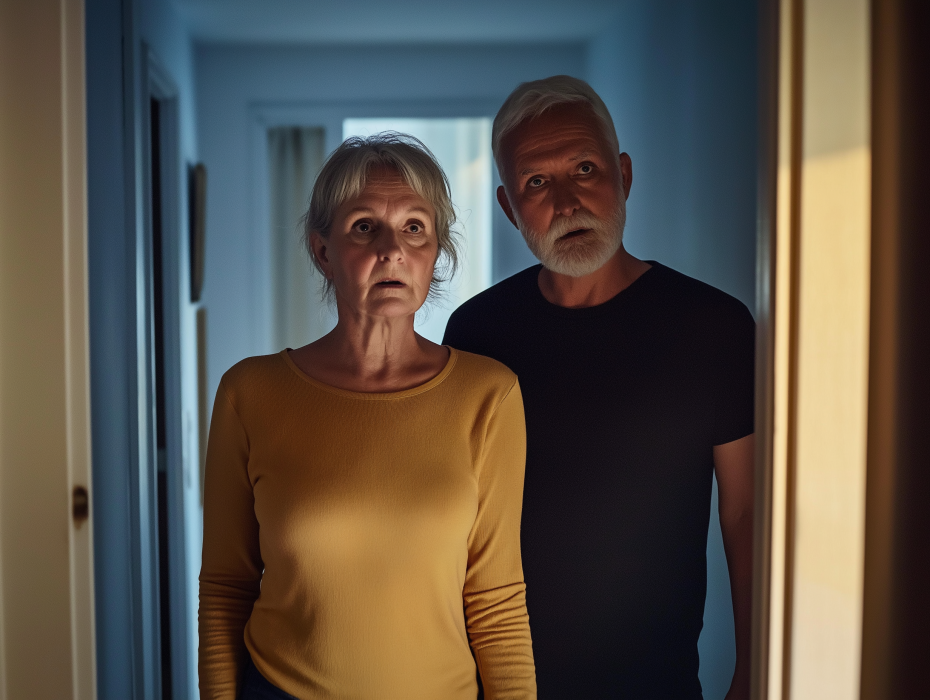
She checked her reflection in the hallway mirror and gasped. For a heartbeat, a second shape hovered behind her shoulder. When she blinked, gone. “I saw—” she began. “No,” he interrupted firmly, voice louder than necessary. “No, you didn’t.” His hand trembled as he reset the light switch.
The temperature dipped, subtle but undeniable. Her breath curled faintly. “Broken thermostat,” he muttered, adjusting it twice, each beep sharper than confidence deserved. He rubbed his arms briskly, claiming drafts, while she rubbed her rosary beads faster, each prayer colliding with the next. Silence returned, thin, stretched, and temporary.
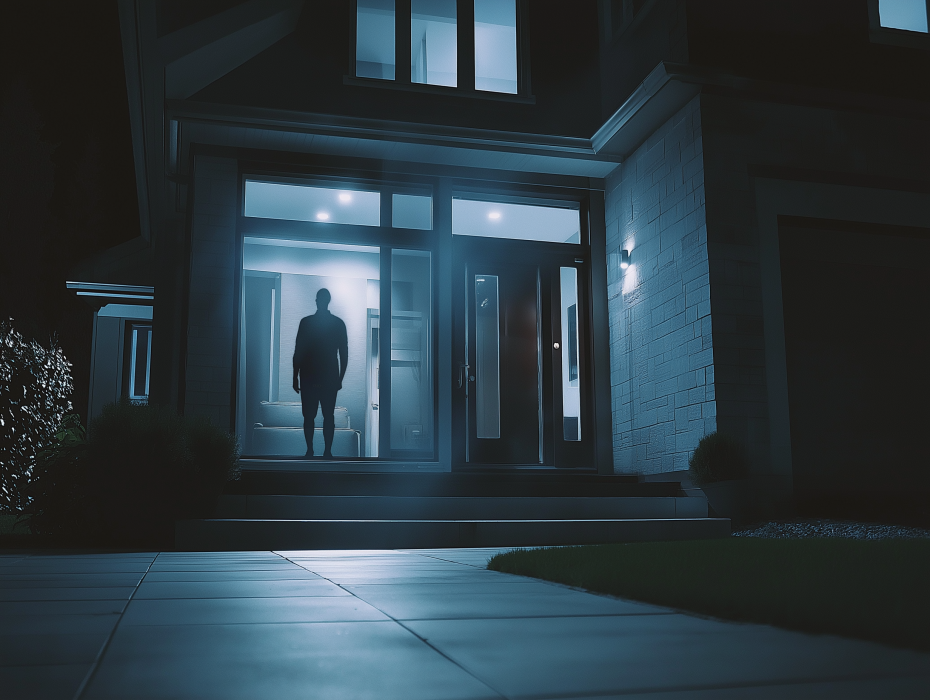
Marco triggered the front camera into “offline” mode for three seconds. Their phones chimed with a black square. “System error,” the uncle muttered, tapping rapidly. The feed blinked back, smeared, distorted. A shadow slid across the porch, dissolving into pixels. His aunt shrieked, clutching his sleeve. He shushed her irritably.
He armed himself with a golf club, dismissing her suggestion of the police. “And say what?” he scoffed. “That shadows scared us?” He strode the hallways, club raised. His shoes betrayed him, tripping over a rug. She stifled a laugh, half-crazy with nerves.
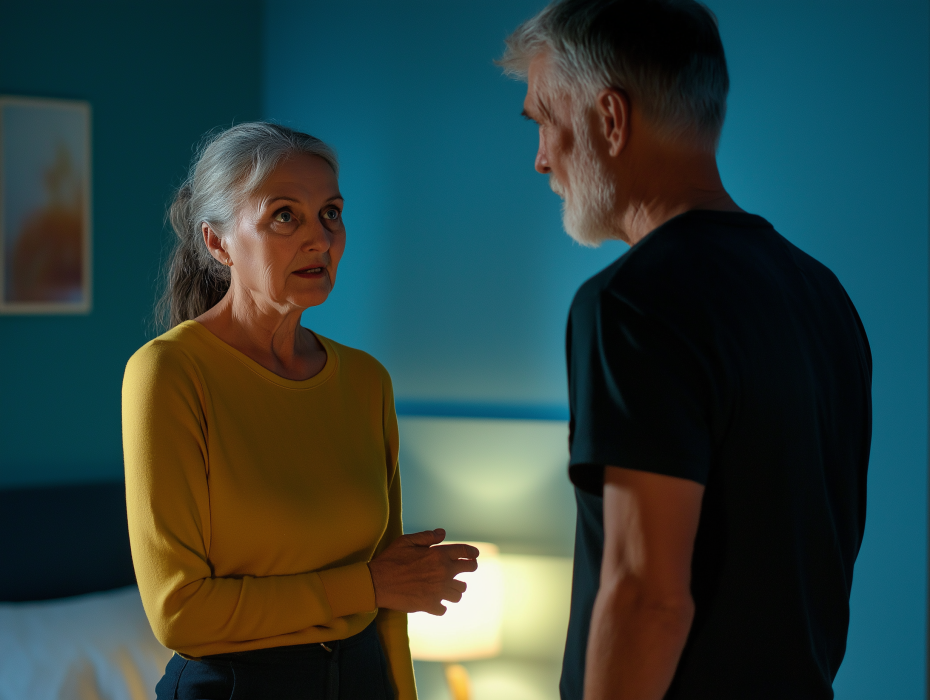
Marco dimmed the kitchen light, leaving the dining room glowing. From inside, the contrast cast shadows across the ceiling like prowlers circling. She whimpered. He squared his shoulders. “This house is ours,” he declared shakily. The chandelier above tinkled, every crystal disagreeing. He tightened his grip on the club.
The stereo coughed another rustle: zippers, papers shuffling, almost a voice cut short. His aunt clutched her jewelry boxes to her chest. “For safety,” she insisted. Her uncle rolled his eyes, though he followed her lead, pocketing one of Marco’s watches. Fear made thieves of them both, scrambling to protect what wasn’t theirs.
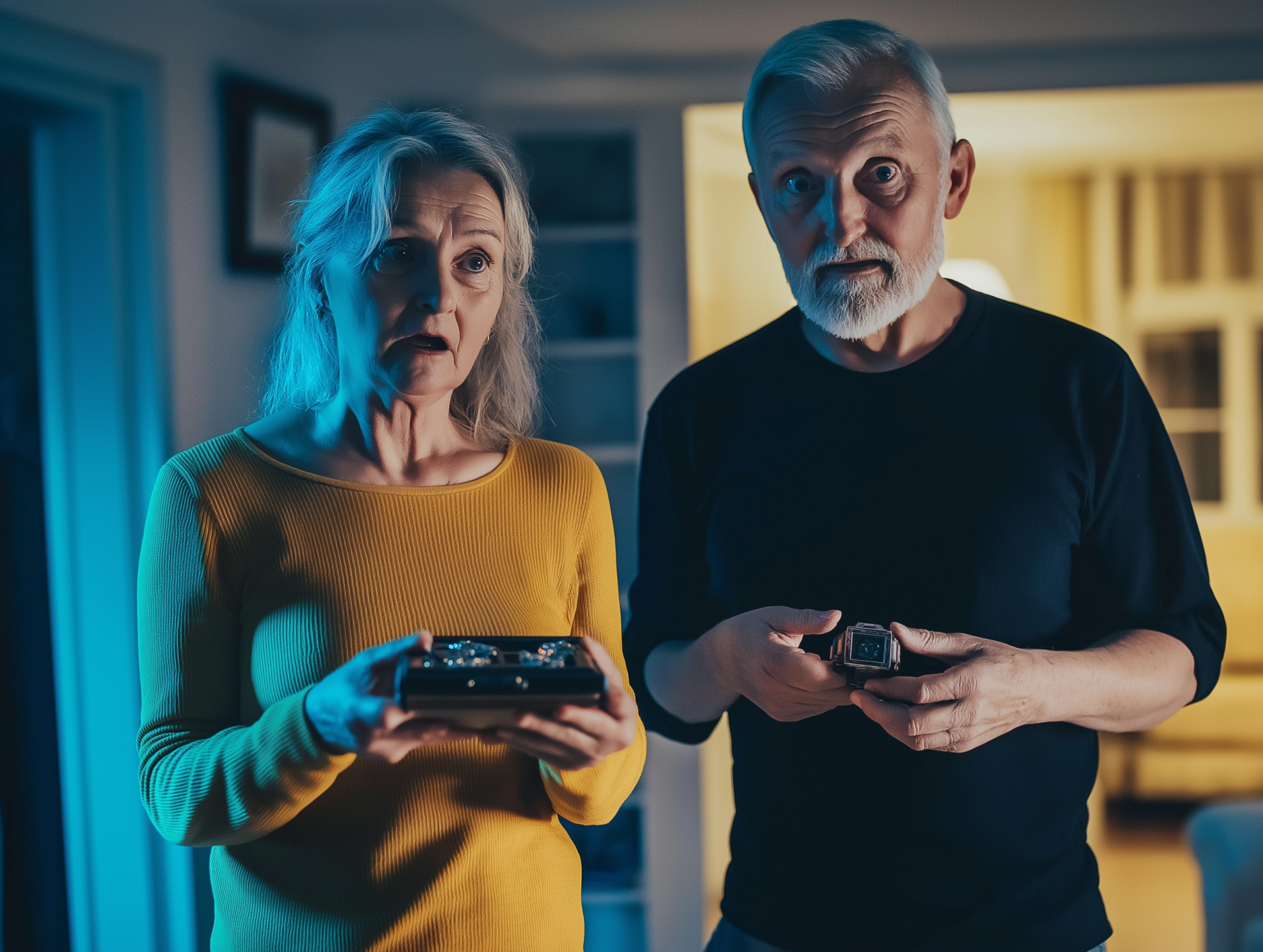
They retreated upstairs, finally, muttering excuses. “Tomorrow we’ll sort deeds. Tomorrow, lawyers will explain everything.” She locked the bedroom door, double-checked it thrice. He set the golf club against the dresser like a bayonet. In bed, they whispered, breaths shallow. Below, Marco prepared Act Two.
At eleven, the kitchen lights dimmed further, the hallway brightened, and the smart lock on Marco’s bedroom door clicked. It whispered open, then shut. The downstairs camera sent an innocuous ping that was routed to their phones: A slow movement in the pantry and an unrecognized device nearby. His uncle’s silhouette stiffened against the blinds.
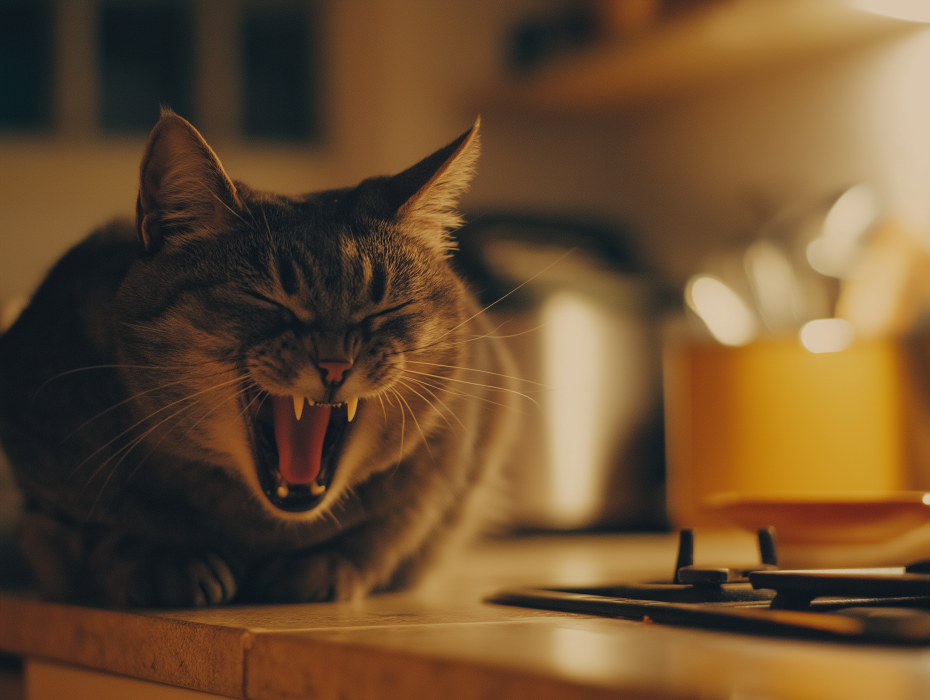
A minute later, a low conversation slipped from ceiling speakers in the dining room: two male voices negotiating inventories, almost bored. “Take watches, tray, and then office files,” one murmured. Another chuckled. “Cash first.” Marco throttled volume to a rumor, enough to crawl under one’s skin without proving itself real.
A utensil drawer slid. Marco watched the cat snake along the baseboards, tail bottle-brushed. Upstairs, a hallway lamp hummed alive. The back-door sensor pulsed again; the lock answered with a soft release, and then a confirming click. Doors sighed. Shadows moved.
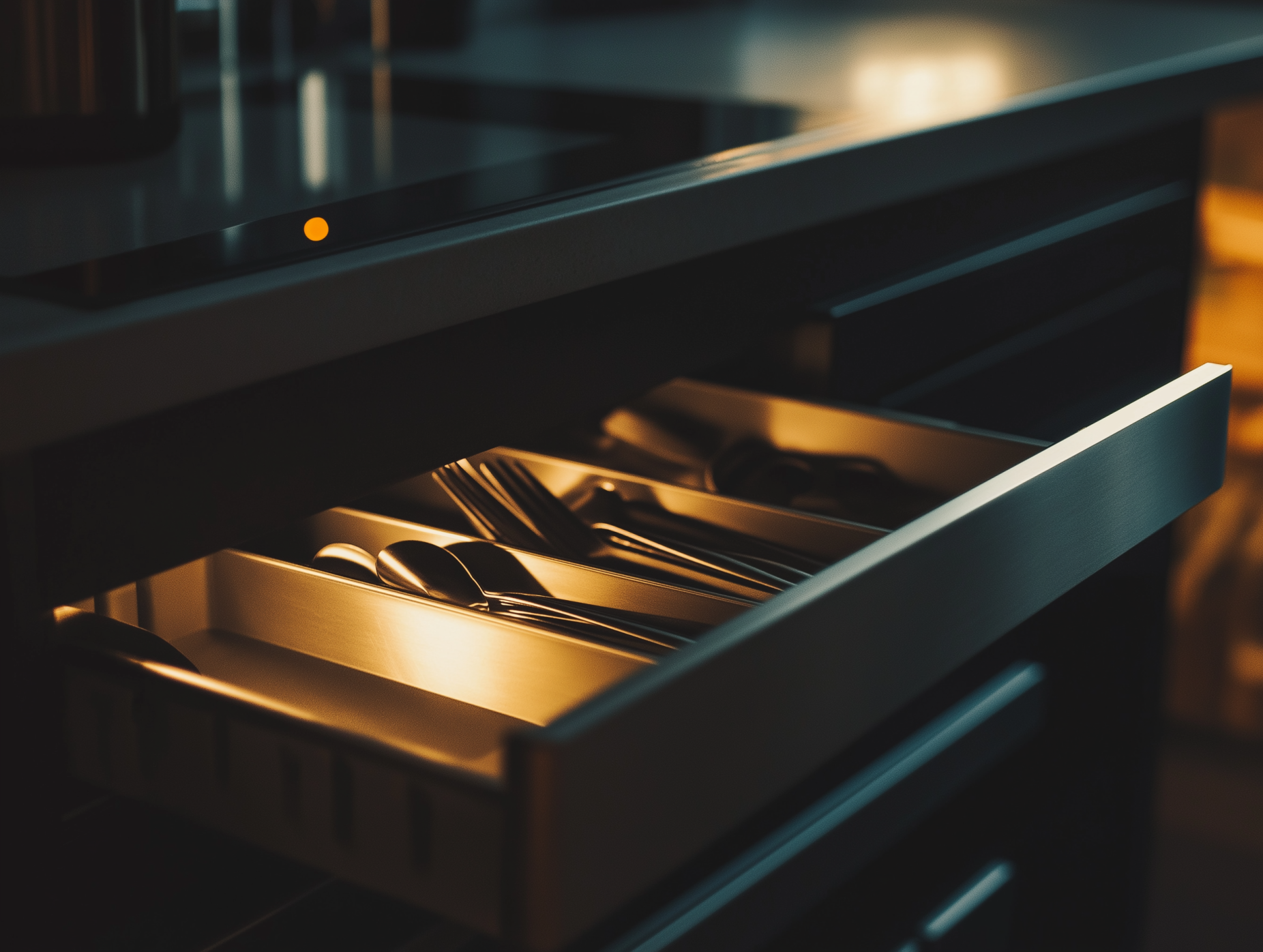
The thermostat nudged downward by degrees, frosting the dining room mirror. The kitchen camera coughed up another notification: pantry motion detected. A second later, the garage tilt sensor reported an opening and settling, as if a panel had lifted. His uncle swore aloud. His aunt whispered a prayer.
In the bedroom, their phones chimed together. They received another alert: Front camera temporarily unavailable. The feed remained black for three seconds, and then it was restored with a smeared, jittered image. A laughing shadow crossed the porch and dissolved. Upstairs, his aunt cried out, and the cat rocketed under the dresser softly.
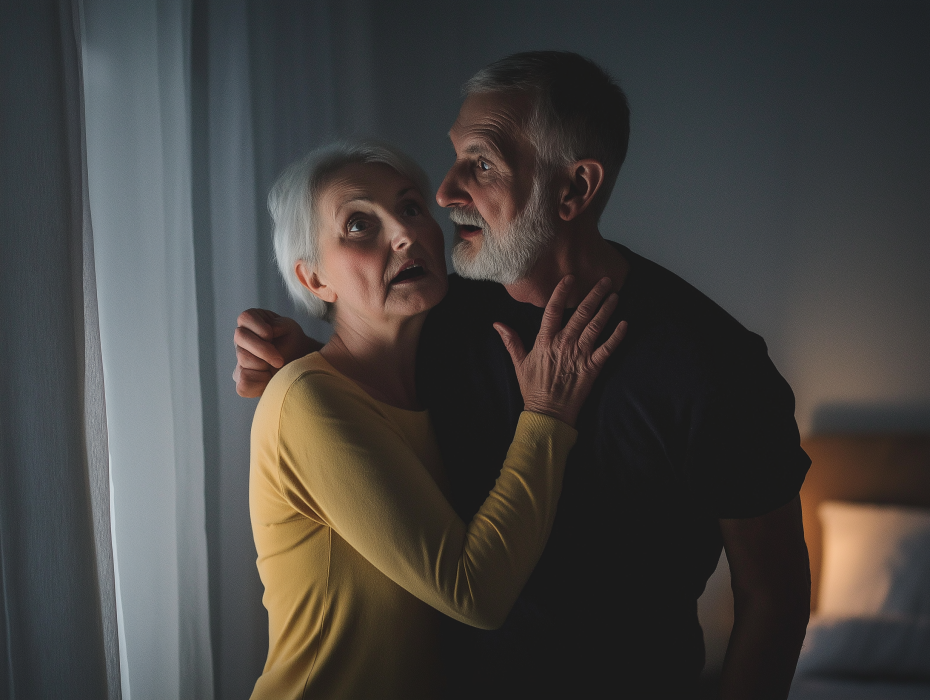
His uncle crept to the landing with a heavy flashlight he never turned on. “Don’t provoke them,” his aunt hissed. “They’re downstairs and probably armed. They’ll come up.” A kitchen cabinet sounded as if it had been knocked down. A hallway sensor chimed politely that motion was detected. Then came adjusted pacing, footsteps that reached the stairs.
An unmistakable whisper came through the vent, close and intimate. “Back door. Then upstairs.” A tiny metallic note of a blade tasting porcelain came right after this. The aunt clapped a hand over her mouth. His uncle finally locked their door. Marco could almost hear his heart beating overtime.
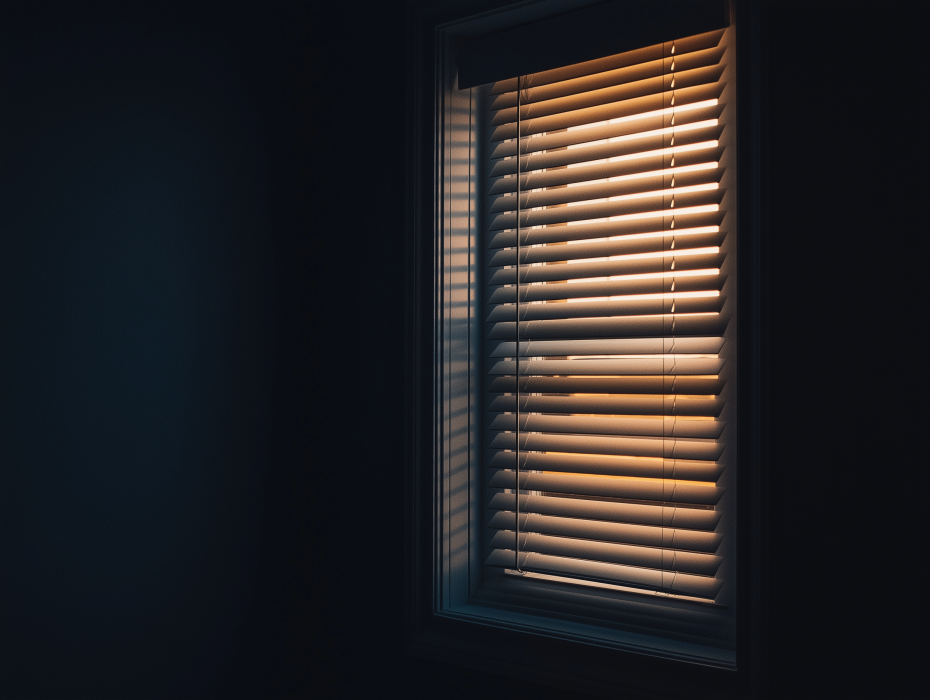
Marco waited, counting his own breathing, then rolled the study’s smart shade halfway, letting streetlight slice the wall like a prowler’s flashlight. The house inhaled. Downstairs, the stereo murmured the rustle of bags. A spoon rang lightly on quartz. The undermount lights flared and then faded to conspiratorial gloom.
A window contact clicked from closed to open to closed in delicate succession. He sent a final camera glitch—porch presence briefly obscured by an elbow, or maybe a shoulder. The whisper returned, almost amused: “Keys, then upstairs.” His aunt sobbed. His aunt mouthed the words call someone, but didn’t move herself.
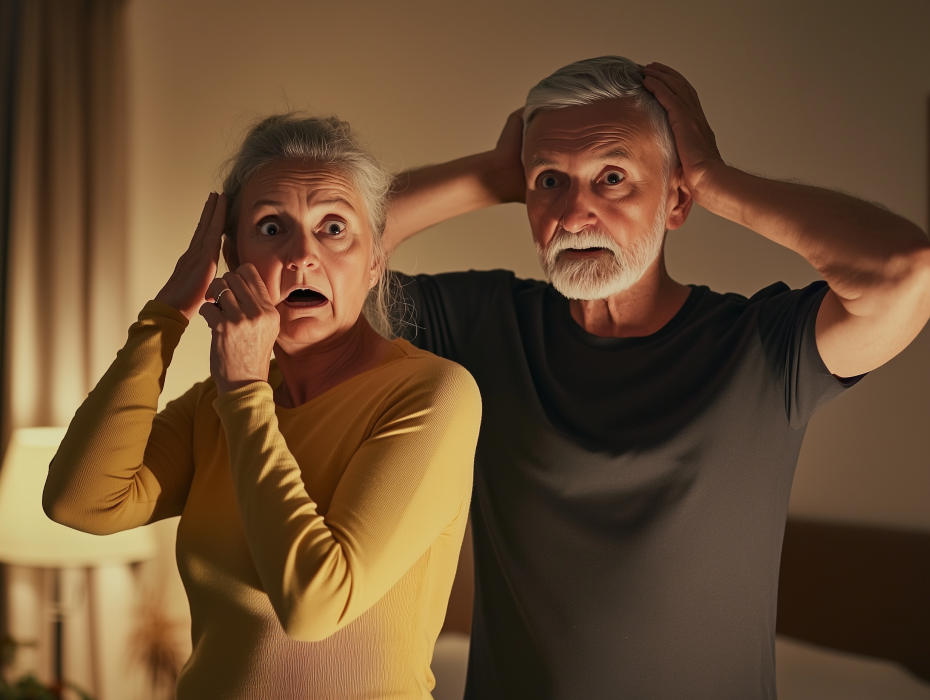
Marco kept the phones online. Let them call if they truly wished. But he also sensed fear prefers whispering to dialing, and pacing to deciding. He scheduled three cabinet taps, two soft door thumps, and a retreating footstep that never fully retreated. The house performed. The audience perspired. Nobody applauded, which was perfect.
They huddled upstairs, whispering furiously. “We should call the police,” his aunt urged. “And tell them what?” her husband snapped. “That we have no real papers to prove that this is our place?” She wrung her hands, tears brimming. Another knock echoed from below. This time, neither spoke. Silence weighed heavier than any explanation.
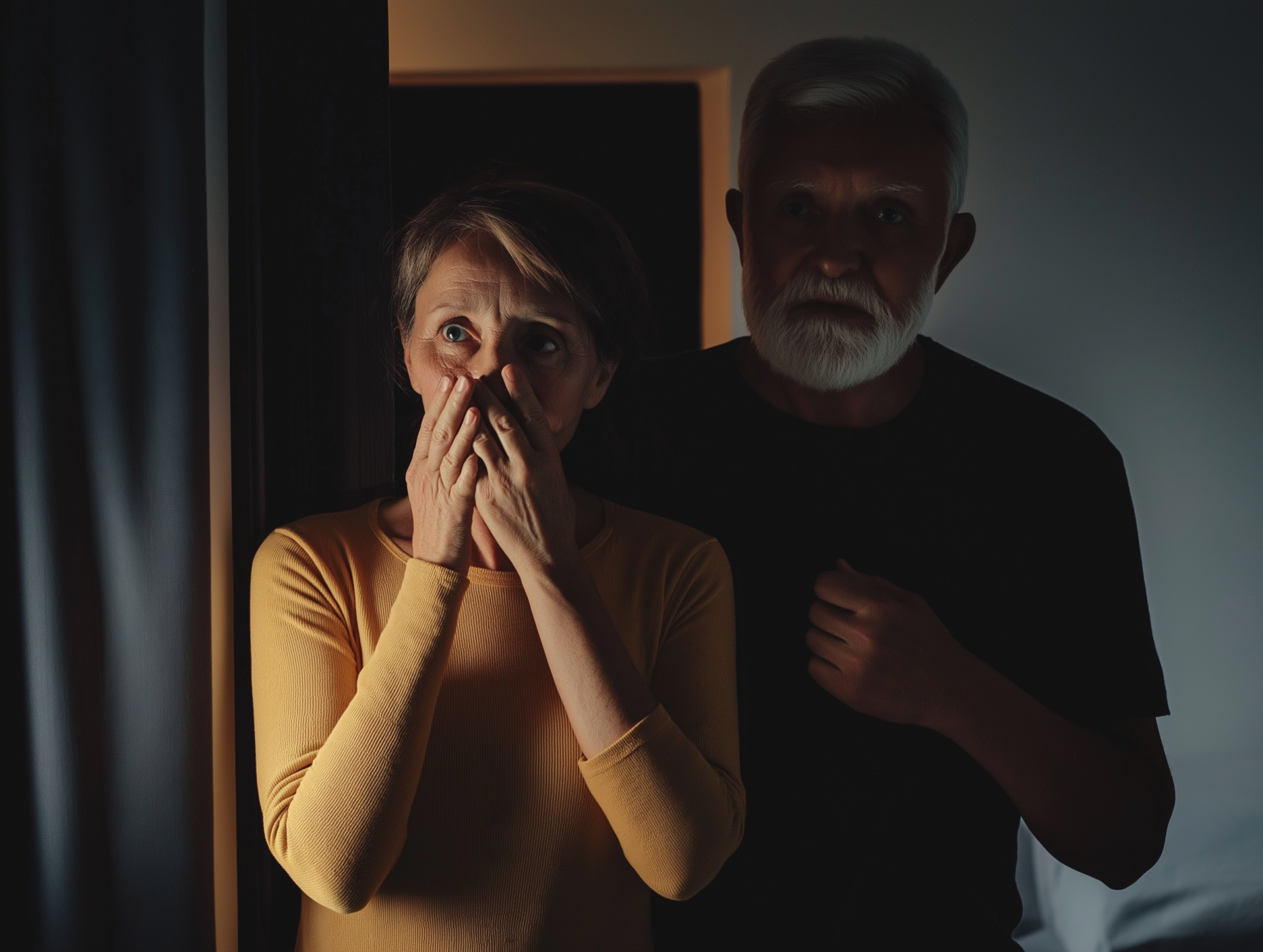
He released the exterior gate with a click his uncle couldn’t hear but might feel. The driveway lights far away pooled brighter, like a stage beckoning escape. He brightened the stair light a shade, then killed it, then brightened it again. Hesitation bloomed, then cracked along predictable lines.
“Go,” his aunt whispered finally, voice frayed wire. “We can’t stay. They’ll come up next.” His uncle swallowed, calculating ancestral pride against mortality. Another vented whisper: “Upstairs.” Marco let the kitchen door lock exhale once more. He heard drawers slam, suitcases scraped from under a guest bed.
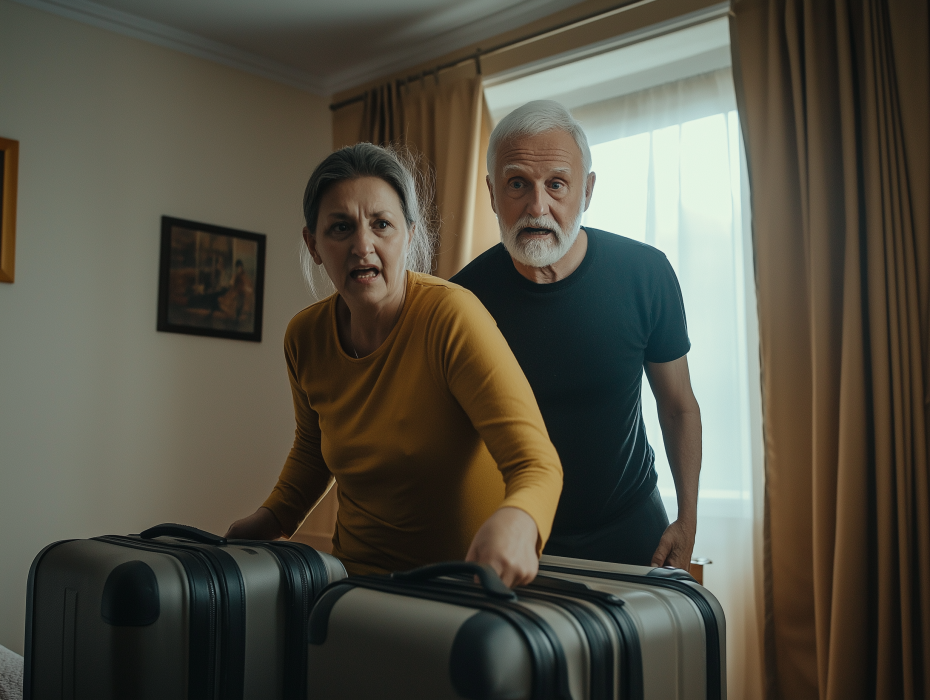
They burst onto the landing, clumsy with haste. The cat disappeared into the darkness, offended but intact. Marco dimmed the foyer to a dusky threat, then highlighted the exit with a single persuasive beam. The front lock was, of course, reset. Marco waited for the couple to open it from inside.
His aunt’s hands trembled too hard to aim the keys. His uncle cursed, then yanked the door wide after grabbing the keys from her hands. The night air felt medicinal. “We’ll come back with police,” he vowed shakily to the empty driveway, not noticing the camera’s tiny indifferent wink.

A pajama hem caught, ripped, and was abandoned. The sedan sputtered awake. As they reversed, Marco let a porch light flare to an accusatory white, then settled it kindly to amber. The street swallowed them. The house exhaled, panels relaxing like bones after sprinting.
Silence climbed the stairwell, step by careful step. Marco waited in the car until the sedan’s taillights dissolved, then walked to his door. The keypad accepted the new code he wrote. The hinge sang. The foyer welcomed him with that expensive emptiness only safety can afford.

He stood very still, listening for any leftover footstep he hadn’t scheduled. There was nothing. The house was a paused orchestra. He closed the door, manually locked it, and leaned back until the oak touched his shoulder blades. The cat padded from the shadows, asked a question, accepted an answer, and forgave everything.
Marco switched on the hallway lamps gradually, easing brightness like dawn. Nothing stirred except his heartbeat. He placed his suitcase by the stairs, too tired to climb, too exhilarated to sleep. The house smelled of his soap and his polish again, not their cologne. He breathed like, not a refugee, but the owner he was.
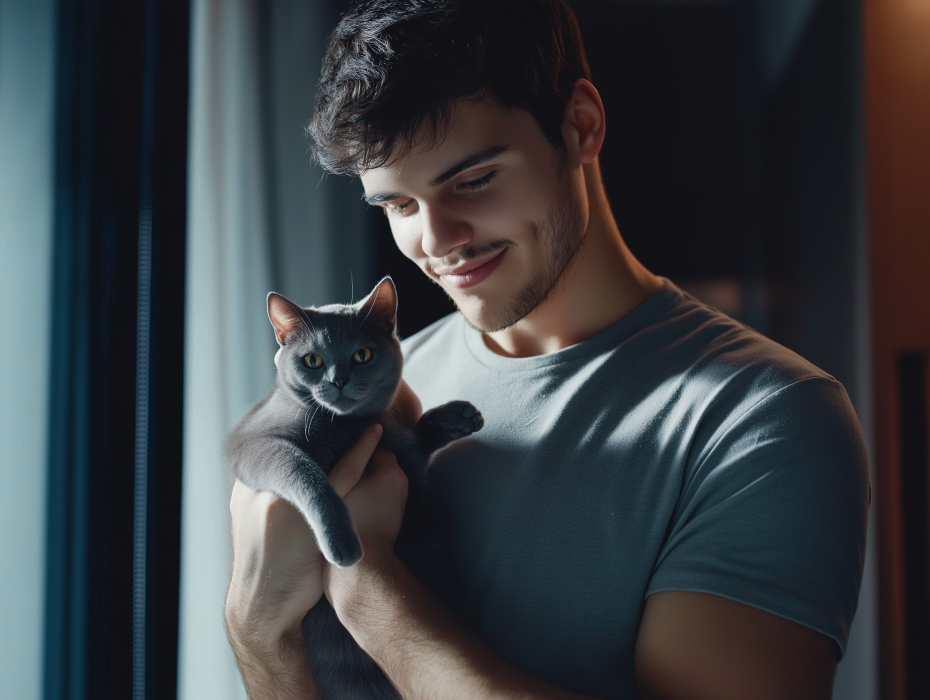
He checked the rooms carefully. Guest beds half-stripped, drawers yanked open, a scarf left behind. In the kitchen, teacups cooled beside crumbs, and a clock ticked innocently. The pantry sensor that had terrified them winked at him: battery seventy-one percent. He almost laughed, but instead he poured water, steadying shaking hands.
The cat twined between his legs, purring with relief, or hunger, or solidarity. Marco crouched, rubbed behind her ears, and whispered, “We’re fine now.” Her tail flicked like punctuation. Together they patrolled each corner, and with every step the house felt more his, less invaded, its pulse beating steady again.

He carried the suitcases they had dragged halfway, setting them politely by the porch. They could collect their possessions in daylight, he thought. Tonight belonged to silence, not confrontation. He tidied overturned cushions, reset thermostats, and drew curtains with reverence. The house exhaled gratitude, as if finally free of squatters.
However, peace carried a shadow. Their words, loophole, possession, and contest echoed. Had they discovered something, even if twisted? Courts respect paper. He rose again, fetched the folder they’d thrust at him. He skimmed, frown deepening. His lawyer would need to know everything.

He photographed each page at careful angles, then stacked them aside. He made his call before they could regroup. The lawyer took some time to consider everything before telling him that the pages looked forged. He knew the lawyer would handle the police. Opportunism, Marco vowed, breathing in relief, should never again find hospitality under his roof!
